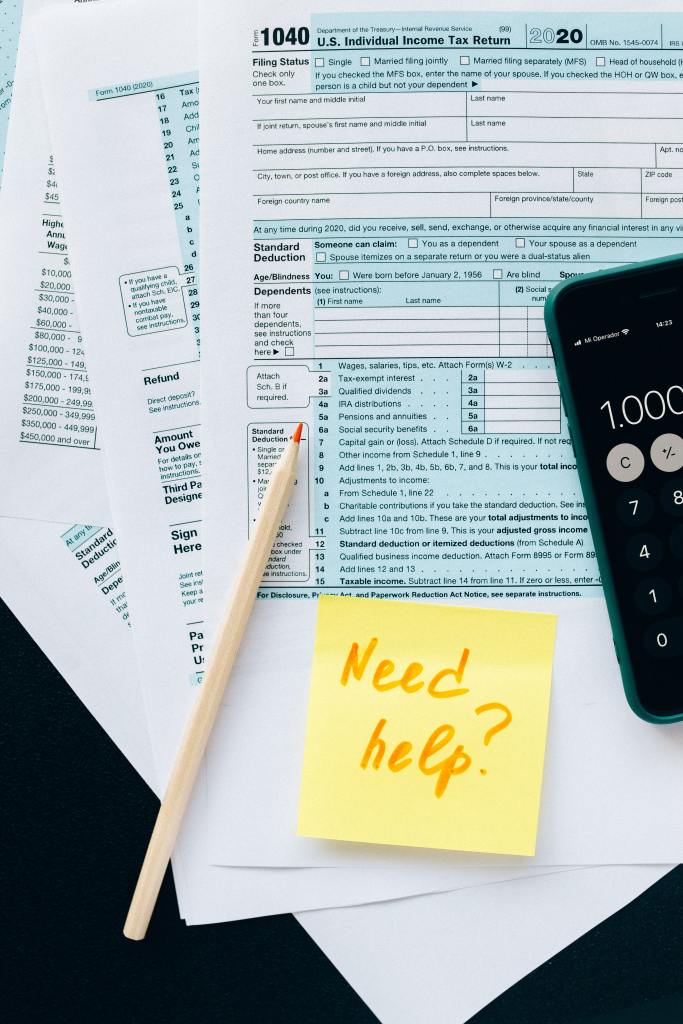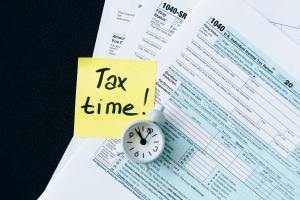- Taxes Made Simple: #1 Beginner’s Guide to Successful Filing
- Documentation Needed
- Ways To File
- Ready, Set, File!
- Kept Records Keeps Taxes Simple
- Tax Filing Made Easy: A Beginner’s Guide to Success!
- SimplySoundAdvice.com Tax Filing Checklist
- SimplySoundAdvice.com Tax Glossary: Expert Resources for Tax Season
- File Via Form or Tax Pro? Know Your Options
- Tax Filing Made Simple: Your Questions Answered
- Conclusion
Taxes Made Simple: #1 Beginner’s Guide to Successful Filing
When it comes to tax time, things can seem overwhelming, but they don’t have to be. Taking the time to understand the process and planning ahead can make the process of filing taxes a much easier one. Gather all the necessary documents and information beforehand and consider seeking the help of a tax professional if needed. Taking the time to review your forms for accuracy can prevent costly mistakes and delays in filing. Finally, make sure to submit your taxes on time to avoid any potential penalties.
Documentation Needed
The most important step before you even begin to file your taxes is to ensure that you have all the necessary documents and information that you will need to complete the process.
What Docs?
The items you need to keep are things like your W-2s, 1099s, any other income statements that you may have, and any other documents that may be relevant to your tax situation.
Say No to Tax Refund Delays!
There is a possibility that your taxes can be delayed if you do not have the necessary documents, so it is extremely important to ensure you have everything you need before you start doing your taxes.
Continue Reading for Full Checklist!

Ways To File
Once you have all the required documents, the next thing you need to do is decide how you would like to file your taxes. A number of options are available to you regarding filing your taxes, such as preparing them yourself, using tax software, or hiring a professional tax preparer.
The pros and cons of each of these options are different, so it is important to evaluate your situation in order to determine which option will work best for you. There are some risks involved in preparing your taxes yourself, but it also allows you to save a lot of money in the long run.
On the other hand, if you hire a professional tax preparer, you are guaranteed that your taxes will be done correctly and at a higher cost. Be sure to consider both sides before deciding which option to go with. Alternatively, you may be able to find a happy medium between filing your own tax return and hiring a professional tax preparer.
Tax Software Can Help!
One of the alternatives to this would be to use a tax software program, of course. In addition to being user friendly, tax software can provide guidance throughout the process and provide assistance if needed.
Save Money!
Additionally, it can be a much more cost-effective option than hiring a professional to do it for you. It can also be helpful in eliminating potential errors that could lead to costly penalties or missed deductions in the future.
Check out our other article about tax preparation software if you want to learn more about it!
Ready, Set, File!
When you have decided how you are going to file your taxes, the next step is to actually begin the process of filing your taxes.
Taking Your Time is Crucial: Say No to Tax Audits!
In this case, it is important that you take your time and be patient with the process. As tempting as it may seem, it’s important not to rush through the process and to take your time to ensure that everything is accurate in the process. Making a mistake can lead to an audit, which is the last thing you want to happen to you.
Kept Records Keeps Taxes Simple
As soon as you have completed the process of filing your tax return, it is important to keep a copy of it for your records as soon as you have completed the process of filing your taxes. You can refer to this document at any time if you need to refer back to it for whatever reason you may have in the future. In addition, you also need to make sure that you have received any tax refunds or payments that you may be entitled to as well.

A copy of your tax return is very important to keep, and it is in your best interest to keep it for as long as you can in case you get audited by the Internal Revenue Service, which may take up to ten years in some cases.
If you have a copy of the return on hand, it will be much easier and simpler in the future, and you can provide the necessary documentation and information much more quickly. Also, it is important that you get the full amount of your refund or payment that you are entitled to so that you do not get shortchanged.
Tax Filing Made Easy: A Beginner’s Guide to Success!
Work Smarter Not Harder!
It doesn’t have to be a stressful experience to do your taxes. When you take the time to plan ahead and be organized, the process can be much smoother and easier to manage. Anyone can handle their taxes with confidence if they prepare properly and have a thorough understanding of how they work. When you plan ahead, you can make sure that you have all the documentation you need and that everything is in order.
Research for the Savings-Deductions
You can also research any tax deductions you may be eligible for and take full advantage of them. Having a good understanding of the process and the forms you need to complete can also make it less stressful.
SimplySoundAdvice.com Tax Filing Checklist
Filing your taxes doesn’t have to be a daunting task. With the help of SimplySoundAdvice.com, you can navigate tax season like a pro.
Here’s a handy checklist to keep you organized and ensure a successful filing:
1. Gather Your Documents
- W-2s from all employers
- 1099 forms for freelance or self-employment income
- Mortgage interest statement (Form 1098)
- Student loan interest statement (Form 1098-E)
- Any other income statements (e.g., interest, dividends)
2. Identify Deductions and Credits
- Review potential deductions and credits based on your situation
- Collect supporting documentation (receipts, invoices, etc.)
3. Choose Your Filing Method
- Decide whether to file by filling out tax forms yourself or using a tax professional
- Explore e-filing options for a quicker and more accurate submission
4. Review Personal Information
- Double-check your personal information, including Social Security Number and address
- Ensure information for dependents is accurate and up to date
5. Calculate Your Taxable Income
- Gather all sources of income and calculate your total taxable income
- Determine whether you’re eligible for any adjustments (e.g., student loan interest deduction)
6. Fill Out Relevant Tax Forms
- Choose the appropriate tax forms based on your filing status and situation
- Complete all sections accurately and legibly
7. Claim Deductions and Credits
- Enter relevant deductions and credits on the appropriate forms
- Double-check calculations to maximize your tax savings
8. Review Your Return
- Carefully review all entries and calculations on your tax forms
- Check for errors or missing information
9. Sign and Date Your Return
- Sign your return where required (electronically if e-filing)
- Include your current date of filing
10. Choose a Filing Method
- If filing by mail, make a copy of your tax return for your records
- If e-filing, follow the instructions provided by your chosen platform
11. Pay Any Owed Taxes
- If you owe taxes, review payment options and deadlines
- Include payment details on your tax return or follow e-filing payment instructions
12. Keep Copies of All Documents
- Make copies of your signed tax return and all supporting documents
- Store them in a safe and organized place for future reference
Remember, this checklist is just a guide to help you stay organized during tax season. Each individual’s tax situation is unique, so it’s always a good idea to consult with tax professionals or use resources like SimplySoundAdvice.com for advice.
Here’s to a successful and stress-free tax filing season!

SimplySoundAdvice.com Tax Glossary: Expert Resources for Tax Season
Navigating the world of taxes can often feel like deciphering a cryptic code. That’s where our expert resources come in to help you decode complex tax terms and ensure you’re claiming every deduction and credit you’re entitled to.
Here’s a breakdown of key tax terms and concepts that can make tax season a breeze:
Adjusted Gross Income (AGI): Your AGI is your total income minus specific deductions, such as student loan interest, IRA contributions, and alimony payments. It’s a crucial starting point for calculating your tax liability.
Deductions vs. Credits: Understanding the difference between deductions and credits is essential. Deductions reduce your taxable income, while credits directly reduce your tax liability. Expert resources will help you identify deductions related to education, homeownership, and medical expenses, as well as tax credits for childcare, education, and energy-efficient upgrades.
Tax Brackets: Tax brackets determine the percentage of your income that goes toward taxes. Knowing your tax bracket helps you estimate your tax liability and plan for potential tax-saving opportunities.
Standard Deduction vs. Itemized Deductions: Determine whether you should take the standard deduction or opt for itemized deductions. Expert resources will guide you through the pros and cons of each approach, helping you choose the one that works best for your situation.
Capital Gains and Losses: If you’ve sold investments, understanding capital gains and losses is crucial. Expert resources break down short-term and long-term gains, as well as how losses can offset gains to potentially reduce your tax burden.
Tax Withholding and Estimated Payments: Learn how tax withholding from your paycheck or estimated tax payments affect your overall tax liability. Proper management of these can prevent unexpected tax bills or penalties.
Dependents and Exemptions: If you have dependents, understanding exemptions is key. Expert resources explain the difference between personal exemptions and dependent exemptions, helping you maximize your deductions.
Tax Filing Status: Your filing status (single, married filing jointly, head of household, etc.) determines your tax rates and deductions. Expert resources guide you through selecting the right filing status for your situation.
Taxable vs. Non-Taxable Income: Certain types of income, like gifts and inheritances, may be non-taxable. Expert resources clarify what income should be reported and what can be excluded from your taxable income.
Tax-Advantaged Accounts: Expert resources cover various tax-advantaged accounts, such as IRAs and HSAs, and explain how contributions and withdrawals can impact your taxes.
Navigating taxes doesn’t have to be a confusing ordeal. With our expert resources, you’ll gain the knowledge and confidence to tackle tax season head-on. Empower yourself with the information you need to ensure you’re claiming every deduction, credit, and benefit you’re entitled to.

File Via Form or Tax Pro? Know Your Options
When it comes to filing taxes, the decision between filling out tax forms yourself and using a tax professional service depends on various factors, including your personal situation, comfort level with tax matters, and the complexity of your financial affairs.
Filing via Tax Forms:
Filling out tax forms yourself is a viable option if you have a relatively simple financial situation. This method is often chosen by individuals with straightforward employment income, minimal deductions, and no complex investments. It allows you to have a hands-on approach to your taxes, gaining a better understanding of your financial situation.
Many online tax preparation software tools simplify the process, guiding you through each step and offering explanations for various tax terms and calculations. However, it’s important to be diligent and accurate while inputting information to ensure your return is error-free.
Using a Tax Professional Service:
Engaging a tax professional, such as a certified public accountant (CPA) or a tax advisor, can be particularly beneficial if your financial situation is more intricate. This could include scenarios like owning a business, having investment properties, or dealing with significant deductions and credits.
A tax professional’s expertise can help you navigate complex tax codes, maximizing deductions and credits while minimizing the risk of errors. They stay up to date with tax law changes and can provide tailored advice based on your unique circumstances. Hiring a tax professional not only potentially saves you time and stress but also offers peace of mind that your tax return is accurate and optimized for your financial situation.
Join in the Conversation at Simply Sound Society our Social Media Platform and Forum!

Tax Filing Made Simple: Your Questions Answered
Q: What documents are essential for filing taxes?
A: The key documents required for tax filing include your Social Security or Tax ID number, W-2 forms from all employers, 1099 forms for other income sources, 1098 forms for mortgage interest, and receipts for deductible expenses like charitable donations or medical expenses. Remember, the documents you need may vary based on your specific circumstances.
Q: How do I determine the correct filing status?
A: There are five filing statuses: Single, Married Filing Jointly, Married Filing Separately, Head of Household, and Qualifying Widow(er) with Dependent Child. Your filing status impacts your taxes and potential refunds. Choose the status that best fits your situation, and if eligible for more than one, calculate your taxes using each to see which is most beneficial.
Q: What is the difference between tax credits and deductions?
A: Tax deductions lower your taxable income, while credits directly reduce your tax bill. Deductions include education expenses, charitable donations, and home mortgage interest. Credits reduce your tax liability dollar-for-dollar and can significantly impact your tax bill. Research and determine which credits you qualify for to maximize your tax savings.
Q: What common mistakes should I avoid when filing taxes?
A: Avoid filing with incorrect or incomplete information, forgetting to sign your return, filing late, not reporting all income, and not keeping records of deductions and credits. Double-check all information for accuracy, ensure you sign your return, file on time or request an extension, and keep detailed records.
Q: What are my options for filing taxes?
A: You can file taxes electronically using tax software, file a paper return by mailing it, or hire a tax professional. E-filing is convenient and time-saving but requires some technical proficiency. Paper filing involves filling out and mailing physical forms. Hiring a tax professional provides expertise and guidance, particularly for complex tax situations.
Q: How does e-filing work and what are its benefits?
A: E-filing allows you to submit your tax return online. It’s a convenient option that can save time and offers the advantage of faster processing and quicker refunds. E-filing is generally more accurate than paper filing and reduces the risk of lost returns. Most tax software guides you through the process, making it easier to file accurately.
Q: When should I consider hiring a tax professional?
A: Consider hiring a tax professional if your financial situation is complex, such as owning a business, having investment properties, or dealing with significant deductions and credits. Tax professionals can help navigate complex tax codes and ensure accurate and optimized returns.
Remember, each individual’s tax situation is unique. While this FAQ provides general guidelines, consulting with a tax professional or using reliable resources like SimplySoundAdvice.com can provide more personalized advice.
Conclusion
In conclusion, the decision between filing via forms and using a tax professional ultimately depends on the complexity of your finances, your comfort level with tax matters, and the time you’re willing to invest. If your finances are straightforward and you’re confident in your ability to accurately complete tax forms, self-filing may be a cost-effective choice.
However, if you’re dealing with complex financial matters or want the assurance of professional expertise, working with a tax professional service can ensure that your tax return is thorough, accurate, and in your best financial interest.
Do not forget to check out all of our exciting free tools! Calculators, quizzes and downloadable checklists all for free.

















